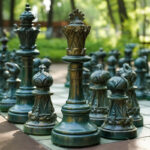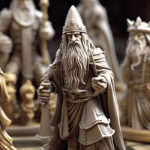Are you an intermediate chess player looking for ways to enhance your game? One of the best ways to improve your chess skills is through reading chess books. Chess books provide valuable insights on strategy, tactics, and various other aspects of the game. In this article, we’ve compiled a list of the 10 best chess books for intermediate players (1200-1800 ELO) to help you take your chess skills to the next level.

Why Chess Books are Important for Intermediate Players
Reading chess books is an essential part of learning and improving in the game of chess. Middle-game, endgame, and opening books all provide different perspectives on the game and can help players develop a more comprehensive understanding of the game of chess. By learning from past masters and contemporary experts in chess, intermediate players can develop their critical thinking and improve their chess strategies.
Enhancing Your Chess Knowledge
Above all, reading chess books provides valuable knowledge about the game. Chess books often present challenging puzzles, instructive game analyses, and top-level insight on various positions. By engaging with this content, intermediate players can take what they learn from the books and apply it directly to their games. To improve your knowledge, it is recommended that you spend at least 20 minutes a day reading chess books or studying a particular aspect of the game.
For example, one of the most popular chess books for intermediate players is “My System” by Aron Nimzowitsch. This book is known for its innovative ideas and strategies that have influenced the game of chess for decades. By studying this book, players can gain a deeper understanding of positional play and how to control the board.
Developing Critical Thinking Skills
Reading chess books promotes critical thinking, encouraging players to consider moves and potential outcomes in unique and innovative ways. Studying different strategies and tactics can help you develop your own playing style and improve your chances of winning games. When reviewing game analyses and puzzles, take the time to evaluate every move and consider what might happen next. Through this practice, you will develop your critical thinking skills and become a stronger chess player.
Another way to develop your critical thinking skills is to study games of famous chess players. By analyzing their moves and strategies, you can learn how to think like a grandmaster and improve your own game. For example, studying the games of Bobby Fischer can help you understand the importance of tempo and how to use it to your advantage.
Learning from Masters
Chess has a rich history, with many legends and champions who have contributed significantly to the game. Through reading chess books, intermediate players can learn from the past masters of the game and expand their understanding of chess. By studying and reflecting on famous games and the strategies used, players can analyze and identify the best chess moves and learn how to apply them in their own games.
One example of a famous game that intermediate players can learn from is the “Immortal Game” played by Adolf Anderssen and Lionel Kieseritzky in 1851. This game is known for its brilliant sacrifices and strategic play, and studying it can help players understand the importance of initiative and how to create winning opportunities.
In conclusion, reading chess books is an essential part of improving your game. By enhancing your chess knowledge, developing critical thinking skills, and learning from past masters, intermediate players can take their game to the next level and become stronger chess players.
Top 5 Chess Books for Strategy and Tactics
When it comes to developing your chess strategy and tactics, the following books are some of the best out there. Whether you are a beginner or an advanced player, these books offer valuable insights and strategies to help you improve your game.
‘My System’ by Aaron Nimzowitsch
‘My System’ is a classic chess book that covers a wide range of topics, including how to analyze positions, pawn structures, and the importance of positioning pieces. The book is particularly useful for beginners and intermediate players, as it provides a solid foundation for developing your chess strategies.
Nimzowitsch was a strong chess player and theoretician who helped to revolutionize the game in the early 20th century. His ideas about controlling the center, limiting opponent’s pawn breaks, and the importance of piece coordination are still relevant today.
‘The Soviet Chess Conveyor’ by Mikhail Shereshevsky
‘The Soviet Chess Conveyor’ is a great book for intermediate players who are looking to improve their calculation skills. The book covers a wide range of topics, including positional play and endgame studies, and offers suggestions on how to cultivate strong intuition and a sound thought process. Through reviewing the games and strategies of top-level players, readers can learn about the importance of planning and developing a solid game plan.
Shereshevsky was a Soviet chess trainer who helped to develop many top-level players, including Anatoly Karpov. His book provides valuable insights into the training methods used by Soviet chess players during the Cold War era.
‘Winning Chess Tactics’ by Yasser Seirawan
‘Winning Chess Tactics’ is ideal for intermediate players looking to hone their tactical skills. The book contains numerous chess exercises that help players identify valid moves and calculate potential outcomes quickly. Through careful consideration and analysis, players can learn how to make the best moves under pressure.
Seirawan is a well-known American chess player who has won numerous national championships. His book provides practical advice on how to improve your tactical skills and win more games.
‘How to Reassess Your Chess’ by Jeremy Silman
‘How to Reassess Your Chess’ is a highly recommended book for intermediate and advanced players looking to take their game to the next level. The book covers a broad range of topics, including middlegame and endgame strategy, pawn structure, and the importance of positional play.
Silman is a well-respected chess author and teacher who has written many books on the game. His book provides a comprehensive guide to improving your chess skills and understanding the game at a deeper level.
‘The Amateur’s Mind’ by Jeremy Silman
‘The Amateur’s Mind’ is a book that takes a unique approach to teaching chess strategy. The book challenges readers to think more carefully about their moves and to consider alternative possibilities before making decisions. Through reviewing the most common mistakes made by intermediate players, readers can avoid making similar missteps and move towards a more efficient and effective playing style.
Silman’s book is a great resource for players who are looking to improve their critical thinking skills and avoid common pitfalls in their games.
Top 5 Chess Books for Positional Play and Endgames
Developing your positional play and endgame strategies is crucial for improving your play in the game of chess. Chess is a game of strategy, and the more you understand the nuances of the game, the better your chances of winning. The following books offer practical and useful advice on how to develop these skills further.
‘Silman’s Complete Endgame Course’ by Jeremy Silman
‘Silman’s Complete Endgame Course’ is a comprehensive and highly recommended book on various endgame scenarios. Through detailed analysis and explanations, you’ll learn how to recognize and exploit the various strengths and weaknesses of your opponents. This book is a must-read for anyone looking to improve their endgame strategies.
‘Pawn Structure Chess’ by Andrew Soltis
‘Pawn Structure Chess’ is a book that focuses on how pawn structures can influence the outcome of a game. Through reviewing various games and strategies, you’ll learn how to build your play more efficiently and how to use your pieces more effectively. This book is a great resource for players of all levels.
‘Chess Praxis’ by Aron Nimzowitsch
‘Chess Praxis’ is a classic book on chess strategy that provides readers with insight and ideas on using the positioning of their pieces to gain an advantage. By studying the various positions and strategies outlined in the book, readers can improve their positional play and become more effective players. This book is a must-read for anyone looking to improve their overall game strategies.
‘The Art of Attack in Chess’ by Vladimir Vukovic
‘The Art of Attack in Chess’ is a book that provides readers with practical advice and tips on how to develop and execute effective attack strategies. Through insightful analysis and numerous examples, readers can learn how to identify and exploit their opponent’s weaknesses with ease. This book is a great resource for anyone looking to improve their attacking game.
‘Understanding Chess Move by Move’ by John Nunn
‘Understanding Chess Move by Move’ is a highly recommended book for intermediate players looking to sharpen their skills and improve their overall game strategies. Through detailed analysis of over 50 games, readers can develop their intuition and gain insight into the thought processes behind critical decisions. This book is a must-read for anyone looking to take their game to the next level.
Chess is a game of strategy, and the more you understand the nuances of the game, the better your chances of winning. It’s important to study and analyze the moves of great players, and to learn from their successes and mistakes. By reading some of the best chess books available, you can broaden your knowledge, develop your critical thinking skills, and refine your game strategies.
In conclusion, improving your chess game requires dedication, patience, and a willingness to learn. By reading some of the best chess books available, you can broaden your knowledge, develop your critical thinking skills, and refine your game strategies. We hope this list provides you with a starting point to begin your journey towards becoming a stronger and more successful chess player.
FAQs
What are the best ways of improving your chess playing?
Keep playing as much as you can, practice your tactics, and analyze your games after you’ve finished playing to see where you went wrong or what you can improve.
Is chess good for your mental health?
Chess exercises your brain in various ways. It strengthens your brain function and can help to ease symptoms of anxiety and depression.
What are the best books for improving chess strategies?
Bobby Fischer Teaches Chess by Bobby Fischer, The Amateur’s Mind by Jeremy Silman, and 100 Endgames You Must Know by Jesús de la Villa are all good options.
- The 11 Best Books About Cats You Should Read - January 16, 2024
- The 9 Best Books on Building Confidence - January 16, 2024
- Discover the 10 Best Books on the Brain - January 16, 2024









